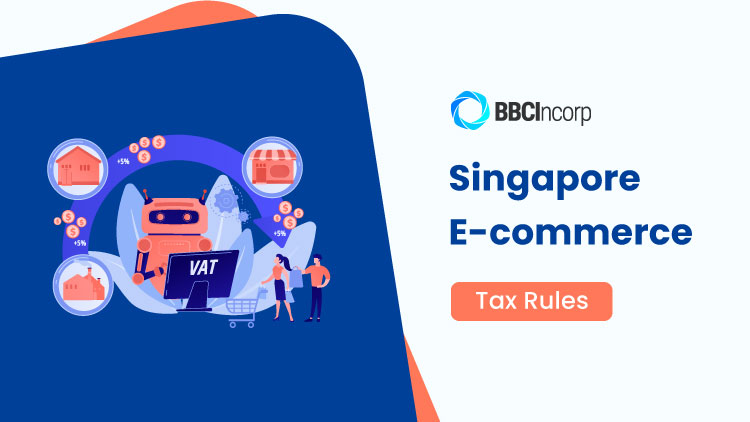
If you’re planning to jump start your Singapore e-commerce company, it’s important to be aware of the country’s tax regulations. In this article, we’ll provide an overview of the relevant tax rules and how they apply to your e-commerce businesses in the Lion City.
Factors that will impact tax on Singapore e-commerce company
The tax regulations for e-commerce companies in Singapore are quite complex, as they are based on a number of different factors.
- The company’s income
As an e-commerce company, your income is taxed in Singapore according to the corporate tax rates. The current corporate tax rate is 17%. This means that if your company earns a profit of S$100,000, you will be taxed S$17,000.
Income from certain digital services, such as online advertising and streaming services, can be also subject to income tax.
However, the foreign-sourced income until it is not remitted into Singapore will be tax-free in the city-state.
Recommended reading: How to be exempted form Singapore foreign income tax
- The type of products or services that are being sold
The type of products or services that you sell will also affect the taxes that your e-commerce company pays. For example, if you sell digital products, such as e-books or software, you can be subject to Singapore Goods and services tax (GST) that might be different compared to others, depending on the amount of sales you generate in the country, or in global.
Common taxes for Singapore e-commerce companies
There are a number of different taxes that e-commerce businesses in Singapore need to pay, including:
- Corporate income tax: This is a tax on the profits of a company. The rate for corporate income tax in Singapore is 17%. Find out more about Corporate tax in Singapore.
- Goods and services tax: GST is a tax on the sale of goods and services, and it is currently set at 7%, applying to the value of goods and services that are sold in Singapore. Read more about Singapore GST
For example, e-commerce company is required to charge GST on the sale of digital goods and services to consumers in Singapore. In addition, the company is responsible for paying GST on any imported goods that are sold online to consumers in Singapore. If your global e-commerce sales (applicable for taxable turnovers) don’t exceed S$ 1,000,000, then you don’t have to pay GST. Otherwise, you’ll need to complete your required duties such as VAT registration, tax payment and invoices, tax filing as per Singaporean regulations.
- Excise duty: If you own an e-merchant and sell alcohol and tobacco, then excise duty is a tax on the import or sale of such certain types of goods that you need to aware.
The tax regulations for e-commerce can change from time to time, so Singapore businesses need to keep up to date with the latest changes. They can do this by checking the Inland Revenue Authority of Singapore (IRAS) website regularly, or by seeking professional advice.
Challenges faced by Singapore e-commerce businesses
One of the key challenges that Singapore e-commerce businesses face is understanding the complex tax system and regulations. Businesses need to be aware of the different types of taxes that they are liable for, such as corporate tax, goods and services tax (GST).
Filing the correct tax returns on time is also worth mentioning. Businesses that operate online need to be especially vigilant in ensuring that their transactions are captured correctly in order to avoid any penalties.
In addition, businesses need to be aware of the updated rules and regulations, as the tax landscape is constantly changing. For example, the Singapore government will be imposing a new GST on digital services from 1 Jan 2023 on all remote services in Singapore provided by GST-registered overseas firms. This is in line with the global trend of governments targeting digital services in order to improve the country’s tax system.
New guide
Start reading to grow your Singapore E-commerce with minimal effort

How can Singapore e-commerce company save money on taxes?
There are some cost-saving tips that you need to take into account when setting up e-commerce business in Singapore.
- Keep track of their income and expenses carefully, as these will be used to calculate the amount of tax that is owed.
- Take advantage of a number of tax deductions and allowances that are available to you. E-commerce businesses may be able to claim tax deductions for certain expenses, such as cost of internet access and web hosting, or advertising costs.
- Take advantage of the goods and services tax (GST) exemption on exported goods, if qualified.
There may be some uncertainties when it comes to taxation for e-commerce businesses in Singapore. Online businesses can stay compliant and avoid any potential issues with the authorities by understanding the relevant tax rules and adhering to them. Hope you’ll find this blog post good insights before you move on.
Disclaimer: While BBCIncorp strives to make the information on this website as timely and accurate as possible, the information itself is for reference purposes only. You should not substitute the information provided in this article for competent legal advice. Feel free to contact BBCIncorp’s customer services for advice on your specific cases.
Get helpful tips and info from our newsletter!
Stay in the know and be empowered with our strategic how-tos, resources, and guidelines.


